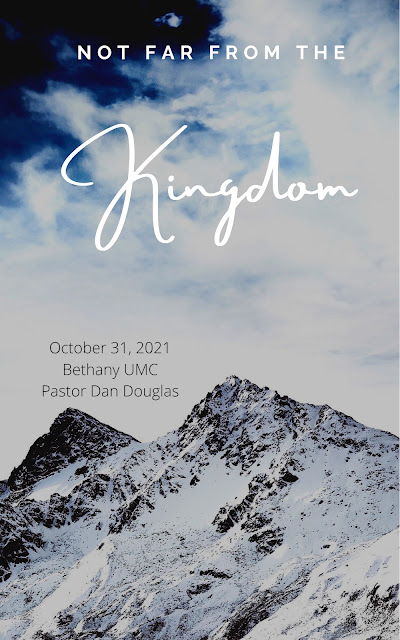Not Far From the Kingdom - Mark 12:28-34 (Proper 26B)
We are blessed to have teachers and former teachers in our congregation, so let’s try a quick experiment. Take a few deep breaths and close your eyes. Think about a time when you learned something new, whether a skill or subject. It could have been at home, here at church, or anywhere.
Now, I want you to imagine teaching someone whatever that was. How would you teach what you had learned?
Ok - let’s come back now.
Our scripture today comes from the gospel of Mark, and let’s set the scene quick. Our reading chronologically happens after Jesus’ final arrival into Jerusalem, so this is after Palm Sunday. Since we’re not in that Lenten headspace, I just wanted to frame the story up. He’s at the top of his popularity, riding the wave through the streets of the city. During the week this is happening, he’s been confronted by religious leaders, whether Pharisees or Sadducees, and GENERALLY, they didn’t like him and the authority he claimed to have. So in the earlier part of the chapter - since our passage begins with “the scribe came near and heard them disputing with one another,” well - the question begs - what were they disputing. So, starting at the end of chapter 11 and through chapter 12, the teachers are questioning Jesus’ authority. Then, there are more leading questions about paying taxes, resurrection. One could say that they’re harassing Jesus to give them answers they want to hear. Not that we do that at all, right? ANYWAY - back to our text, the scribe seems to catch a break in the action and asks Jesus a question that seems like a bit of a softball question. I feel like he’s an ally and helping Jesus get back on track from the trickery from the others. That may not have been the case, and it just could be a question that was asked in bad faith like the others because they wanted to see what Jesus would answer and use the answer against him.
We can empathize with Jesus, who probably feels cornered by all these questions, not really of substance, but of specificity - how do I follow the law as it’s written? So - you could imagine the scribe may be asking, maybe even mockingly, hey Jesus - but what’s the BEST commandment??? HUH? If I have to follow just one law, which one should it be?? This is a human question. We all want things to be simplified for us - life even then was complicated. It’s no wonder that the leaders wanted to know which law was the best because, in their books, they had A LOT OF LAWS. Like - I thought I had read somewhere this week there were over 600 laws for Jews to follow.
I want to think instead that this question was asked in good faith, because as someone who would have studied the law, to ask this question seems honest - he may even be impressed by Jesus. Let’s for a second empathize with the scribe - he’s got questions, and who better to answer them is Jesus. Preachers like to highlight the “Us vs. Them” narrative, but he may be confused with the nature of the law, even sometimes contradictory. So if Jesus could clear up one thing for him, that’d be awesome. The question seems like a humble one as well - what’s most important? How can I serve God the best?
We all like having the best - so much so that businesses are advertising what the best is and why it’s the best. Because if you can have the best, then why settle for good enough? There are whole websites and magazines dedicated to reviewing products because we have too much choice out there to help us make informed decisions about a wide range of products, whether it’s cars or vacuums to things like coffee makers and light bulbs. We have such an abundance of choice that it is SO overwhelming, much like all the specific laws, these Jewish scholars have to learn, teach, and, most importantly - follow.
So - what’s Jesus' answer? Love. You’ve heard it before… this is not a new text to be preached on. This exchange is written in each of the four Gospels, although Mark’s is a little different. He responded by quoting Deuteronomy 6:4-5, which would have been familiar to all who could hear Jesus; it was repeated daily by the Jews as a declaration of faith. It begins with what’s called the Shema, which is Hebrew for “hear.” So the first commandment that Jesus says is to LISTEN. The second part of that is, “The Lord is our God, the Lord alone.” This is the confession that they serve one God, not take many forms, or just multiple deities. This separated them from other cultures because of this fact. The Gospels of Matthew and Luke omit this from their telling of the story, and scholars possibly think that those writers had tendencies to identify Jesus as Lord and God. Then Jesus continues to the following sentence, “You SHALL love the Lord your God with all your heart, and with all your soul, and with all your might.” This is distinctive to Deuteronomy because it corrects the previous emphasis on awe and fear in worship. Also - Jesus adds another facet - with all your mind. This is added because in talking with a different audience, the concepts of heart, mind, and soul have adapted over the years and taken as separate entities.
Jesus then surprises the scribe by adding a second commandment to go with it: quoting Leviticus 19:18 - that you shall love your neighbor as yourself. This might have come as a surprise, but that chapter in Leviticus is instructional on living a holy life. There are rules (which mimic the ten commandments) but teach the reader how to relate to others pleasing to God. Specifically, verses 9-18 are bans on exploiting the poor, not stealing, lying, or profane God’s name, leaving food for the hungry in the field; don’t oppress your neighbor, exploiting employees, or discriminating against the disabled.
Essentially, what Jesus is getting at is there is no love of God without the love of neighbor, which was confirmed by the scribe. He even went as far as to say that these laws are more important than all the offerings and sacrifices.
After all that fighting Jesus had done with the others, he highlighted this one who was willing to ask honest questions about how to deepen his faith.
That’s where we got the title of our sermon today. But what does it mean? Did Jesus think that the scribe would die soon? God’s Kingdom is not about a place to go when we cease our earthly existence. Remember the Lord’s prayer we just recited not that long ago? We prayed that God’s will would be active on earth AS IT IS IN HEAVEN. We need to remember that the purpose of this is to bring the Kingdom of God closer to where we are now. That we don’t have to wait for the big party in the afterlife, that the Kingdom of God can be achieved on Earth.
But the question is, how do we achieve it? Well - let me start over. Our scripture begins with Mark… Just kidding. We reach heaven on earth by acting like the greatest commandment. The more we internalize those two things, the closer we are to the Kingdom. This means - we cannot create the Kingdom all by ourselves. We cannot make the Kingdom by just shutting the church's doors to only those with whom we agree. We cannot create the Kingdom by ignoring the needs of those we talked about through Leviticus.
What is your location as measured from the Kingdom? The scribe knew of God’s plans, but Jesus said that’s not enough. You are only adjacent to the Kingdom, not in it. You can be in the Kingdom by acting out your faith, not just by reading it in the book or listening to me on a Sunday. You need to engage it! Test it out. Jesus was there arguing with those who thought they knew it, but just the ONE who asked the question of what it was all about is the one who was acknowledged as being close to the Kingdom.
Therein lies the answer: it was in front of us the whole time. This is probably not the first time you’ve heard this text preached, nor is it probably the last. The texts Jesus gave would have been well known to the teachers and scholars there with Jesus. He just put them together in a way they may not have expected. That means we need to know our faith and our traditions well enough to teach someone else.
I want to read something that I came across which exemplifies our gospel scripture today. Kaleb Oates, writer and musician, serving at Mt Zion United Methodist Church in Washington DC, writes,
“Friends, do you see how important love is to God?
“O” – I must love OTHERS as myself. I must not be self-consumed and arrogant. I ask God for the desire to connect with others—to pray for them and to serve them, to be willing to give of myself with joy—using my time, money, and energy for a common good. I remember that God has fearfully and wonderfully made all people and that he has a specialized plan for each of us. I join the Christian family in longing for the day when we will look at everyone as a brother or a sister – realizing that we are all equal assets to the kingdom of God.
“E” – I must EXEMPLIFY Christ's Love. The world should be able to tell that I am a follower of Jesus Christ. I will not be tricked into thinking that just because I have memorized a few Bible passages, or just because I lead a song in the choir, or just because I usher on some Sundays, or just because I have a pew and parking spot at church with my name on it that I genuinely exemplify the love of Jesus Christ. I will ask myself, daily, how am I representing Christ outside of the church's four walls? Have I denied myself and accepted the will of God for my life today? Do my actions teach the world how to be more like Jesus, or do they suggest that I am still of the world?
Remember how I started this morning? I asked you to think about a time when you were teaching someone something. I want you this week to try teaching that something to someone else - it could be your spouse, it could be your neighbor, it could be someone in line at the grocery store, just don’t let it be the dog. We all have things to learn, and we need to be open to learning as well, even if it’s stuff we’ve heard before. I bet it may even get you closer to God’s Kingdom the more you open yourself up.




Comments
Post a Comment